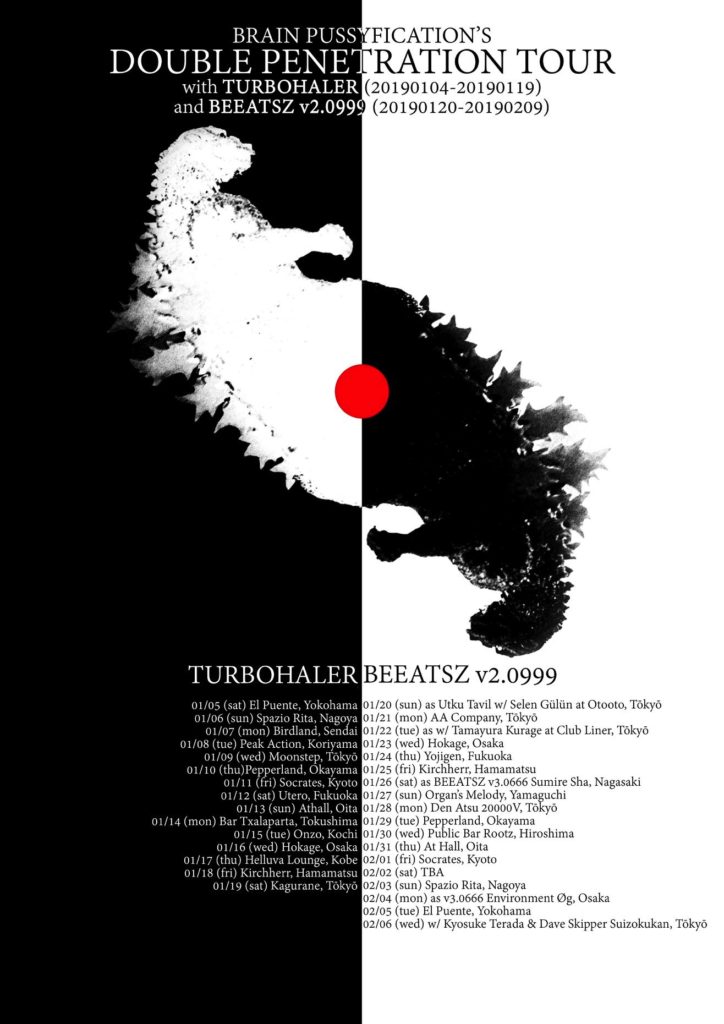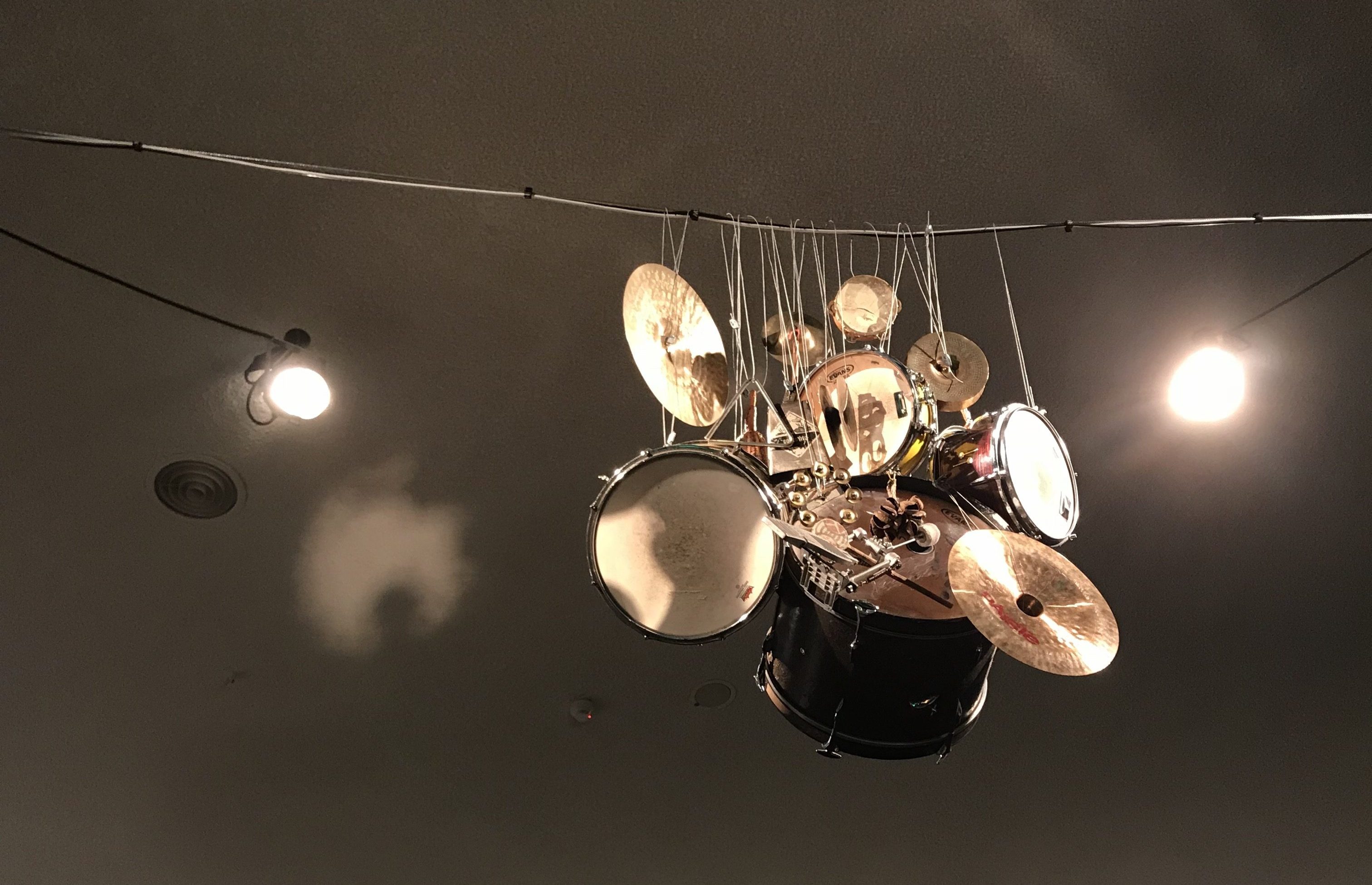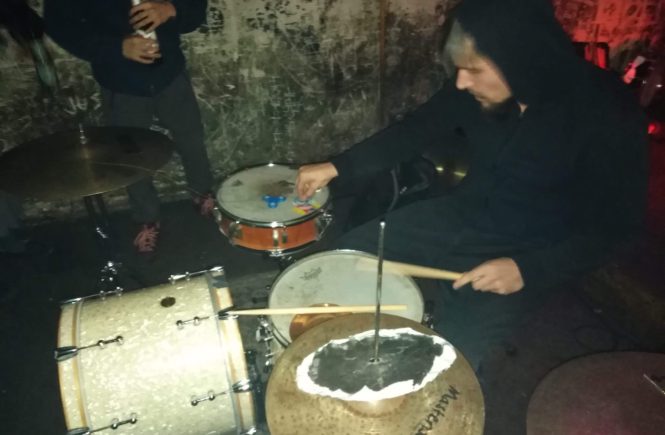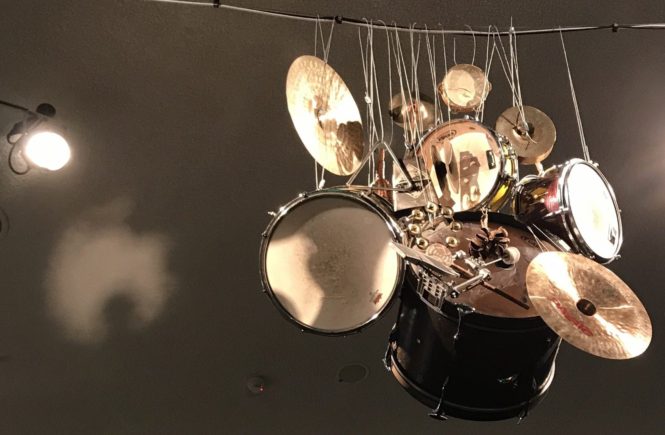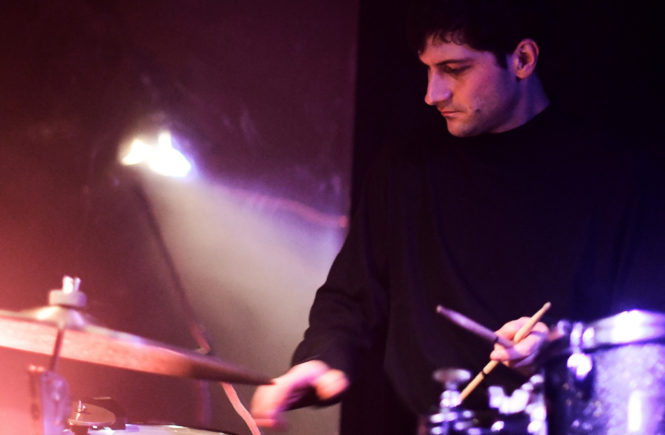…Continuing from Part One
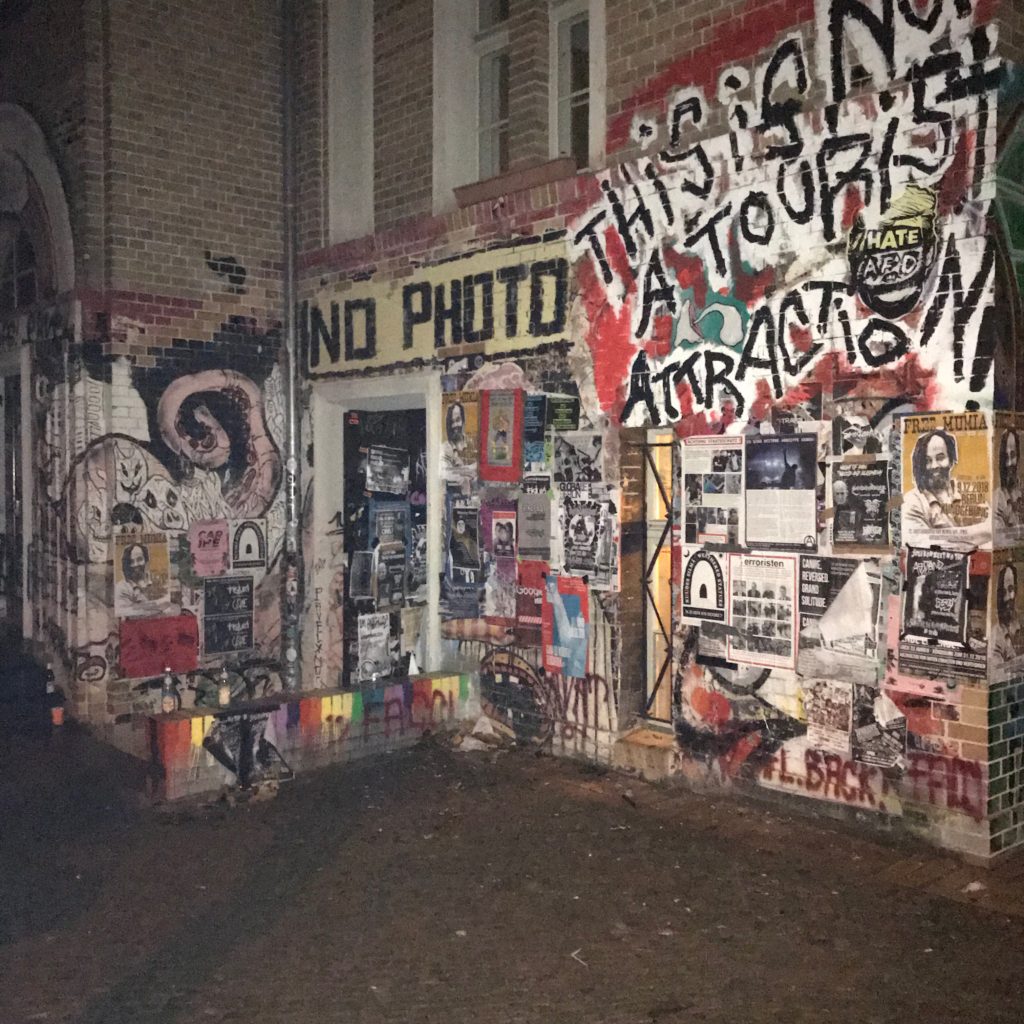
Multiversal #89 //30th of November // at RauXXXaus / Schwester Martha
BUSÆXUS
Dr. Nexus – Voice, Electronics
Marcello S. Busato – Drums
————————————————————————
JEALOUSY PARTY
Roberta Wjm Andreucci – Samples, Mix
Mat Pogo – Voice, Samples
feat. Utku Tavil – Drums
————————————————————————
Jd Zazie
Jd Zazie – turntables, cdjs, mixer
————————————————————————
Company Fuck
ancient sport of karaoke
————————————————————————
čirnŭ x Piña
čirnŭ – electronics
Constanza Piña – Electronics
————————————————————————
M-Sygma Correlation
The duo playing in the dimly lit room, was Constanza Piña a Chilean techno experimentalist and techno-feminism activist, and čirnŭ a musician from Bergen, Norway. The duo’s heavy thick drone-y industrial sounds filled and trembled the air in the room.
After the duo’s performance, some in the audience gathered around the table to examine the duo’s equipment. “This is a radio, and this (pointing to a thick large sheet metal wired with a mic) is a pick-up. It collects feedbacks and the sound is circulating,” čirnŭ explained.
The heavy sheet of metal gave the impression of an ecological statement, not because it was recycled material, but because of the function. Circulating and recycling sound, involving the environment of the entire room until it rumbled to every corner.
Amazed by the variety of gear the duo had wired up, I asked čirnŭ if ‘there was any gear in the past that he got and never used, or had regretted buying?’ His answer was superb. “Never!”he shook his head with a big grin, a grin that told more than any words.
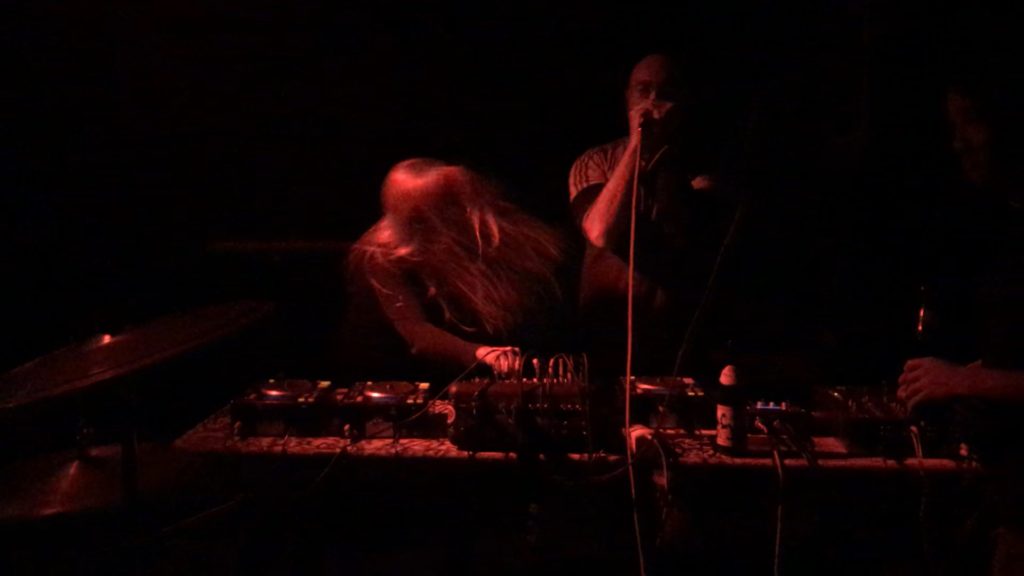
Jealous Party next took to the stage. Mat Pogo on microphone, Roberta WJM Andreucci on cdjs, and this night featuring Utku Tavil on drums. Mat Pogo is like a party, mic in hand he started laughing hard, and free styling vocals in a rhythmic freaky manner.
Their music is cited as ‘Error Music’. Google does not give me good answers to what this might mean. Maybe googling is pointless, you just have to experience it. So, Jealousy Party is Error Music, among R&B and many other things.
As Utku slams beats into the perfect places, Roberta WJM Andreucci utilizes the sampling sounds like a percussionist. The way she uses hands and elbows to athletically manipulate the machines is dexterous yet racking. Good to note to Japanese readers, that this true Italian punk now residing in Berlin, was responsible for bringing Ruins and Yoshida Tatsuya to Italy for the first time in the 90s.
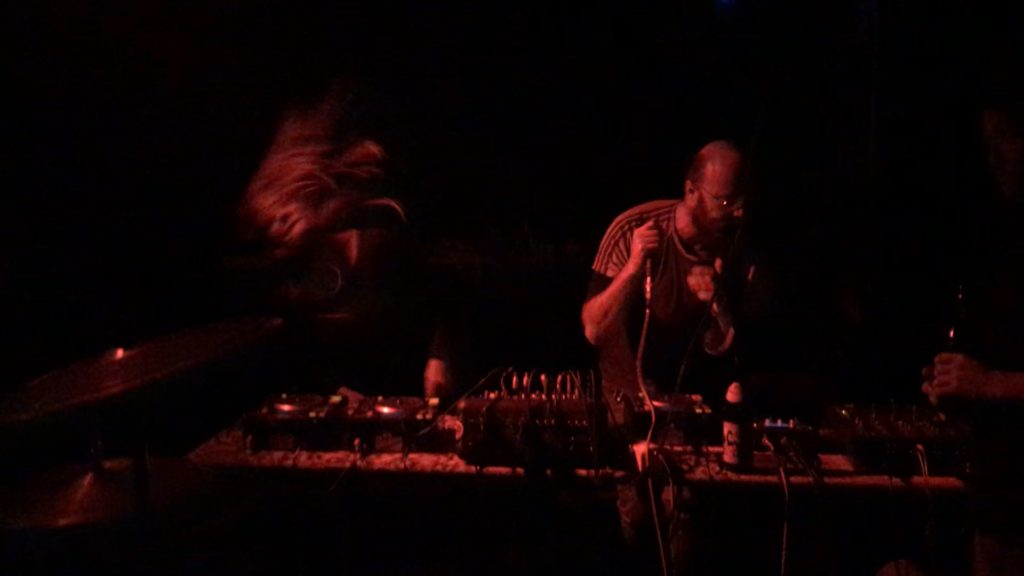
After this Jd Zazie provided a DJ like performance sampling abstract experimental soundscapes, then BUSÆXUS the duo consisting of Dr. Nexus a mad sonic scientist, and Marcello S. Busato the active Italian free jazz drummer delivered a mad raging hybrid music of industrial electronic sounds and acoustic drums. I believe the rage was towards the wars the world is ill with, as the brassard on Dr. Nexus’s arm read ‘Anti War’ in Japanese.
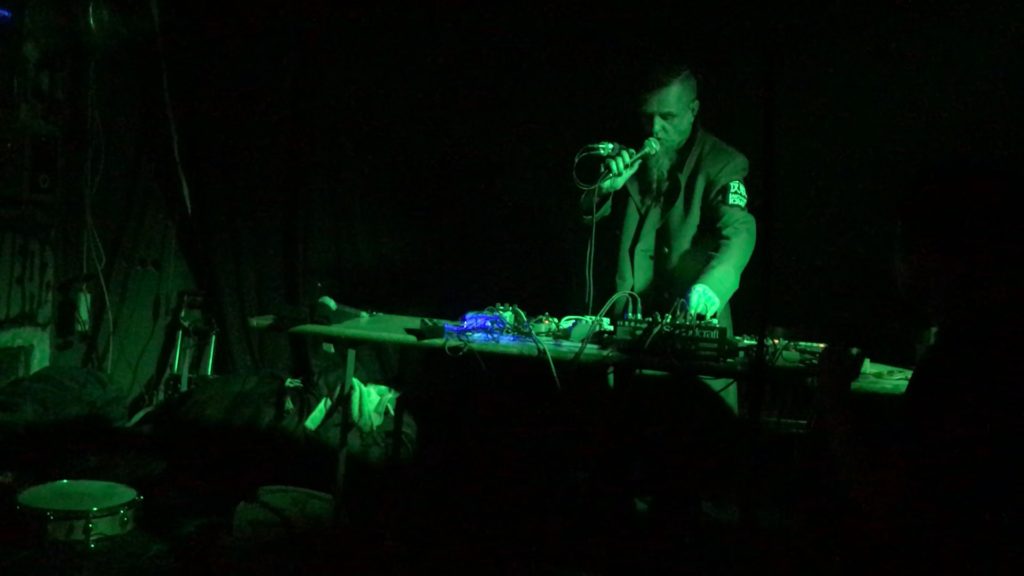
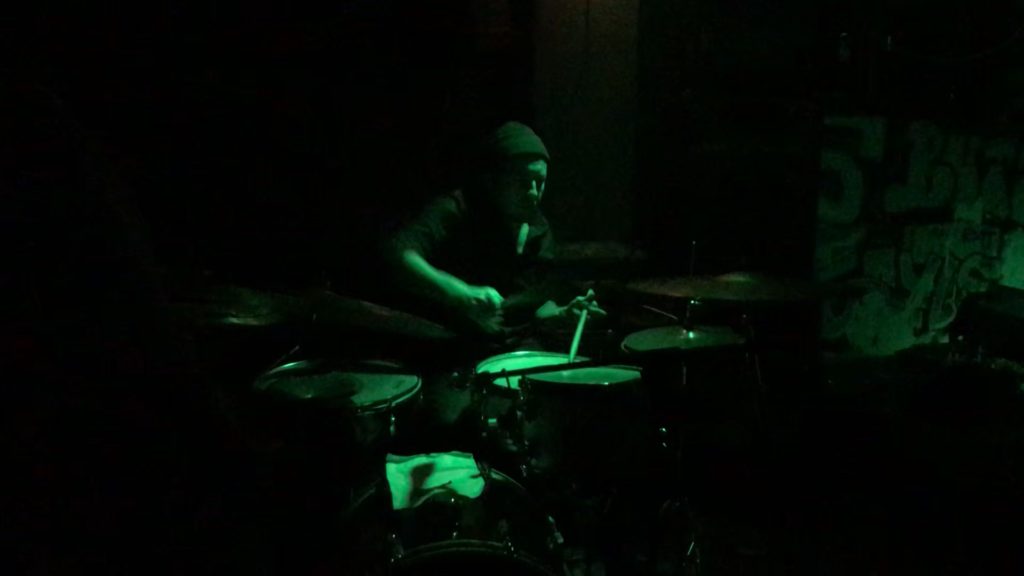
Company Fuck cited as ‘ancient sport of karaoke’ closed the night with a theatrical and interactive performance, an explosion of inappropriate sarcasms and dance moves, but yet loveable… another artist alike Jealousy Party that words and categorization fails to grasp, and you just have to experience to understand the definition.
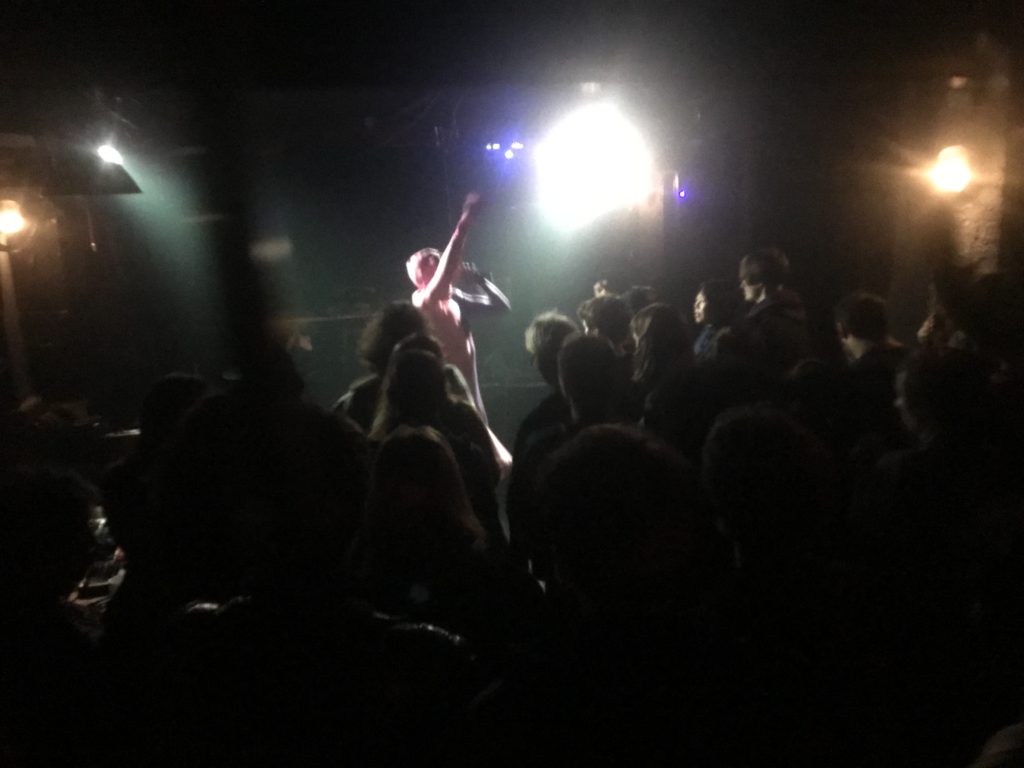
In an attempt to further dig into this non-categorizable and mixed variant of scenes, I talked to Utku Tavil the active drummer, and Anja Tedesko together as Multiversal who were responsible for some of the musical chemistry cooked up here.
Writer (W) : Multiversal is your organization? And Starling Murmurations by Busato??
Utku (U) : Multiversal is organized by me (Utku Tavil) and Anja Tedesko. Starling Murmurations is organized by Marcello Silvio Busato.
W : What’s your roles? with Anja and you? Is Anja also a performer?
U : We are both involved in organization. I am responsible of the technical part, and she is managing the finances/bar, new frontiers (new cities we visit with MultiDOM, touring festivities/gatherings for extreme forms of music under Multiversal) as well as inventing new formats within we organize events: 48h Sprint, summer retreats (or boot camps for uninitiated), workshops for instrument building or movement/sound relations etc.
Anja isn’t a performer but she likes extreme sounds and performances. We have a duo, but we are performing with it rarely.
In 2014 and 2015 she was part of the Altes Finanzamt collective space in Berlin where she was organising single Multiversal events on her own, but we’ve been working together on this since 2014, and taking decisions together.
W : I see!! I also know that you are a kind of sound engineer? Like doing the operation at A l’arme. What got you into that? Did you study acoustics or something?? or totally DIY stuff. It’s really cool you guys organize and tour so much. It’s making a scene. (literally as well.)
U : I am not an engineer as I didn’t study engineering. My formation is based on observation and trial-error.
I started experimenting with recording techniques (very low fidelity equipment) when I was a teenager, therefor mingling with mixers. Started doing live sound when I was in high school and from there both my music and live sound somehow have been entangled to each other…
MultiDOM is under Multiversal, and yes, we are about creating a scene or more like interconnecting various scenes together. We collaborate a lot with local organizers / musicians who self-organize like ourselves. MultiDOM is (semi) open call, so it requires in each city we visit a lot of logistic support for accommodation, backline, sound system etc…
As we operate completely independent from institutions and keep the entrance fees very cheap (even at the events where 30+ musicians and 15+ acts in one night the minimum suggested donation is not more than 5 euros), all the logistics has to be arranged for free, which relies on the community we collaborate with. Therefor organizing the similar format is difficult, due to Japanese venue systems as well as travelling in JP isn’t as cheap as in EU.
We were in Spain, France, Italy, Slovenia, Greece, Turkey, Austria, Switzerland, Netherlands, England, Germany, Denmark, Sweden, Norway and South Africa with MultiDOM.
As we don’t really have a limit regarding styles or genres, the curation is in the mixture of various musicians in ad hoc formations, as well as how the night is organized with what act follows what.
Anja (A) : MultiDOM, touring festivities/gatherings were extended to various cities and countries also by the requests of participating musicians to previous events we have organized. These requests are of course a gateway for us as well as all the participating performers, artists and musicians, to get to know realities and scenes otherwise would be very difficult to get in touch with. (Just as a boring example, in Europe, it isn’t so common that in venues where almost only punk/hardcore concerts are played, hosts an acoustic free improvisation act).
Most of the time the collaborations go beyond Multiversal or the events we have been organizing as well as going beyond Europe. Therefore we can easily say, it isn’t really a festival that we organize but a touring platform focusing on creating new connections, networks between musicians, venues, organizers, public, or in other words diverse socio-cultural and political realities which wouldn’t encounter each other otherwise.
W : I see. This topic is really great, as I was very frustrated as an audience in Japan how the scene is not so well connected and ticket prices expensive. You are really doing something that’s ‘problem solving’.
U : It is expensive in Europe too, that’s why over the years from regular venues we shifted towards squats, occupied houses etc. It is imperative to keep it accessible to people who live with smaller budgets.
And it was and still is a struggle to connect different scenes together as well as different communities even though we are living in the age of immediate communication people are even more afraid than before when it comes to meet with something or someone new. Of course not everyone and thanks to all these people who have the courage, ability and motivation, together we make it happen.
A : Multiversal’s intent is to push people and spaces over their personal limits (including – organizers) ; this is seen on all levels; from how is organized the tour, from one city to other or also from one country to other sometimes with one-day differences, to number of participating projects and artists (since we started MultiDOM, we hosted 5000+ acts with more than 800 musicians) which is the result of our open call policy and accommodation conditions (friends of friends of friends hosting people on their couches, floors, dormitories in squats, rehearsal rooms or sometimes the very stage people play as well as touring musicians with their own campervans etc.)
W : Wow…5000acts??!!!!!! What you guys do, is too impressive. But what you learned and realized, the knowledge might be useful to be shared. At least to inspire other people. As not everyone (or even no one), can do what you guys are doing. Physically, and motivationally, it’s really astonishing.
U : As I said it isn’t only us but all the people we collaborate with. Of course, everyone contributes within their capabilities and some of us have to “work” more than others, but at the end when you have an event like yesterday for instance where everyone working / playing got enough money to pay for a week’s food supply, where all the expenses were covered and there was killer music with a proper sound-system and a public that enjoyed the evening it is quite a good experience.
A : One way we think this is possible (and where the “artistic curation” is happening) is the way we do the line-ups and running orders. Other than people sharing the stage together, we curate formations with participating artists, who have never performed together, and might have a lot in common or uncommon.
This creates an opportunity for everyone to get out of their comfort zones and therefor improve their own capabilities. For the performers to find new expressive languages and modes, for the organisers to learn how to take a risk to put up an act which might “fail” and for audience to be even more accepting and curious towards what’s to come.
Of course to make all of this work together we are in need of certain limitations which in this case is the timeslot for each act, which is limited to 20-25 minutes.
W : Any thoughts on fundings?? I noticed that funding boards here in berlin are also focused on non-high-culture music. This is the term they used. High culture gets approx 700 million euros a year. Berlin music board which is for club culture and up and coming berlin artists, gets 2 million. A lot less, but better than nothing. And I notice there’s even small events in places like loophole getting funding, which is pretty flexible and liberal of the music board I think. Since you guys do too many events, making a financial statement for all these events is too much work, I guess you don’t even consider applying. Or do you? Maybe scholarship for individual musicians more suits your case.
U : We are very happy that loophole after 8+ years of activity, it got a little bit of funding, which allows them to continue their activities after the last year’s 300% increase on their rental contract.
But what saved Loophole from losing its location was the crowdfunding and all the people who passed from their stage thanks to their welcoming booking policies… the crew who runs loophole changed over the years but the spirit was always DIY and relatively non-commercial. The funding they manage to get was a result of hard work of preparation and application process to obtain some funds…
For us there are several reasons behind not applying to funds.
Bigger institutions and/or productions who are regularly funded by the city or various ministries are very exclusive; their programming is very closed and limited within certain scenes. Although in the recent years a lot of contaminated sounds make it to these realities, it still is very closed therefore not so interesting either. As we were talking yesterday, adapting different rooms, different sound-systems, amps or whatsoever helps one to improve their music as well. If one performs always at heavily funded festivals with every technical request provided as it’s written, there’s no room for challenge therefore improvement.
But this isn’t a direct fault of whoever is performing or organizing within these boundaries only. The application process dictates that everything is well prepared and written down to its last detail. This leaves very small room for improvised situations (like a last minute addition to the program because it’s a great act, just to give a banal example).
And as I was mentioning above, it is also at least a half time job. Almost any funded situation has someone preparing the applications and naturally getting a cut. It’s like a booking agency, an intermediary who takes a cut from a deal. Here we are musicians and enthusiasts of extreme forms of music organizing for themselves and other musicians/enthusiasts.
You are correct. In the past it worked out that musicians who were eligible to apply to travel funds etc. who joined MultiDOM tours with some funding for themselves. It was amazing to see that some of them using these resources to move 8 others with a van with themselves between various cities covering the gas and tolls using these fundings.
A : As well as our collaborators who were able to apply to some local funds like in Sardinia, Copenhagen and Oslo to cover some very basic expenses of production as well as a percentage of travel expenses of everyone. There are also funds that we do not apply out of ethical questions.
U: There are bands like MoE who does this also, almost all of their tours were funded by various institutions, and they always had another band with them, The Observatory (SG) in 2012, Jealousy Party (with myself on drums) in 2015, Gerda (IT) in 2017 to name just a few…
Also the way fundings work are ridiculous. But also what it dictates to the beneficiary organization. It isn’t really coherent with how we are working.
Actually, the lack of funding for us works as a natural filter for musicians/performers who approach to us or who we approach. This way we really end up working with people who are actually willing to do things and not just being served and play on a big stage to big numbers for a certain amount of cash and sleep at hotels…
A: In other words we don’t work with rockstars, due to all the things we have explained before.
As the funding mechanisms I’d encountered in Berlin as a foreigner gave me much hope for contemporary music to be recognized as heritage and funded in my homeland as well, I must admit I was disappointed to hear the criticism towards funding coming from inside the Berlin scene. But, a bitter recent experience when I’d found out that my then favorite concert series, Raung Raya was cancelled, explained what problems funding systems were facing.
Raung Raya, an ingenious curation of performances curated by Rabih Beaini featuring Indonesian artists inviting them onto Berlin’s Berghain stage. To many’s despair the series was cancelled after a successful initiation, for production reasons coming from high expectations of treatment in accommodation some of the artists assumed to receive, due to the involvement of Indonesian funding institutions.
After witnessing the first two of the serial nights, where a rare performance of a Moondog composition was presented by Gamelan instruments, or a Sundanese band utilizing traditional bamboo instruments in heavy metal induced format to name a few of the acts, I was convinced that Rabih Beaini’s talent for curation is solid and looked so much forward to the up-coming events. It was obvious that he must have worked so hard to put together such an innovative assembly of talent on stage from the other side of the planet to the acclaimed Berghain stage.
He had worked hard, but the doubt from some of the Indonesian artists were against him and the Berlin production side, accusing that they were unfairly deriving the Indonesian artists of funds. It was like seeing a bridge fall. As is said when a bridge falls, it represents the physical infrastructural failure, as well as the ideological fall of what the bridge represented. Many music lovers were devastated by the news.
Not being dependent on systematic funding and cultivating a music scene in a DIY manner, Multiversal and MultiDOM’s bridges have a different structure, along with the many other DIY catalysts around the globe.
Recent years, Utku Tavil and Anja Tedesko are touring Japan, connecting local underground scenes throughout the islands and making a scene. Their latest Japan tour starts January 5th 2019 with 15 dates as Turbohaler, a two piece unit consisting of Eirik Havnes and Utku Tavil performing a various mix of extreme Metal forms and uncompromising Noise in a free form Improvisation style. The tour is followed by 18 more gigs from January 20th on as BEEATSZ, Utku Tavil’s alias for solo drums and constantly developing projects and collaborations.
To witness some of their works and get a glimpse of the enigmatic scene, catch a local event upcoming early 2019. Multiversal and MultiDOM’s recent schedules can be found here.
